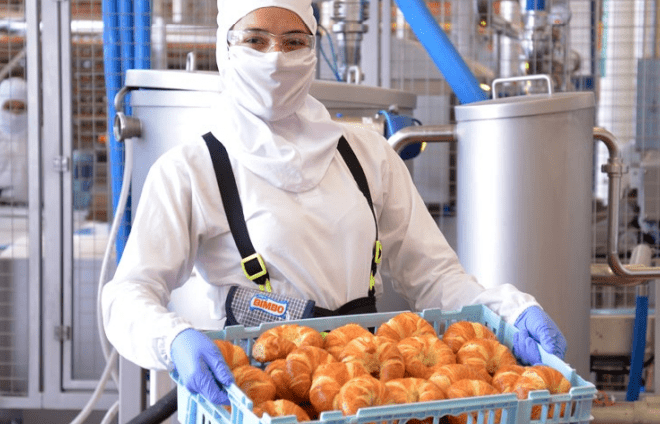Bimbo, through Bimbo Bakeries USA (BBU), faces competition primarily from Flowers Foods and Campbell Soup Company (under the Pepperidge Farm brand) in the United States.
According to IRI Flowers, BBU had a 31% share of the U.S. fresh and frozen bakery products market, which it estimates at $47 billion retail in 2022.
Flowers Foods’ share was 17% and Pepperidge Farm’s was 6%.
The remainder of the market was split between «Private Brands» (19 percent) and other players (27 percent).
Flowers Foods believes this category is intensely competitive and has continued to experience consolidation.
The current competitive landscape for breads and buns in the U.S. baking industry includes a number of smaller independent regional bakers, local bakeries and retailer-owned bakeries.
Some of these smaller regional bakers do not enjoy the competitive advantages of larger operations, including greater brand awareness and economies of scale in purchasing, distribution, production, IT, advertising and marketing.
However, size alone is not enough to guarantee success in the industry.
Bimbo
Flowers Foods reports that competition in the bakery industry continues to be driven by a number of factors, including the ability to serve retail and foodservice customers, generational changes in family-owned businesses, and competitors’ promotional efforts in branded bread and commercial brands.
Competition is generally based on the ability to address changing consumer preferences, product availability (including through e-commerce channels), product quality, brand loyalty, price and effective promotions.
Customer service, including frequent deliveries to keep store shelves well stocked, is also a competitive factor.
Food retailers have offered private labels (also known as Private Brands) for decades.
As mass merchandisers like Walmart have grown and regional supermarkets have continued to consolidate into larger operations, store brands have emerged as major competitors. In particular, this is true in areas where the company does not have a contract to produce the store brand.
The store brand’s share of retail packaged fresh bread in the United States represents approximately 20% of dollar sales and about 30% of unit sales.
Its dollar share had been steadily declining over the past seven years; however, this trend was reversed in fiscal 2022.
United States
According to IRI data, BBU holds a leading position in the categories in which it participates, ranging from basic bakery products to more premium products, pastries, cakes, bagels and muffins.
Grupo Bimbo currently operates 60 bakeries and production plants throughout the United States and has an important distribution network nationwide.
The brand portfolio includes leading national brands such as Thomas’ for English muffins and bagels, Sara Lee for boxed bread, Ball Park for pastries, Entenmann’s for pastries, as well as premium brands such as Arnold, Brownberry, Oroweat and regional brands such as Mrs. Baird’s, Freihofer’s, Stroehmann and Heiner’s.
It also produces and distributes some of Grupo Bimbo’s Mexican brands, such as Bimbo and Marinela in the United States.
Flowers Foods’ main products include breads, buns, rolls, muffins, biscuits and tortillas and are sold under a variety of brand names, including Nature’s Own, Dave’s Killer Bread (DKB), Wonder, Canyon Bakehouse, Tastykake and Mrs. Freshley’s.
The growth and consolidation of the supermarket industry has changed the food retail landscape in recent years, according to Grupo Bimbo.
Customers
Originally, supermarkets excelled at offering a wide variety of products under one roof. As a result, they largely replaced small grocery stores and other retailers that sold only one specific type of product.
To improve efficiency and remain competitive, supermarket chains have started to consolidate. This trend has led to a decrease in the number of retailers.
Furthermore, the rapid growth of retail supermarkets in Europe and the United States is reshaping the competitive landscape. Thus, traditional supermarkets and large retailers face new challenges.
Consequently, Grupo Bimbo and other producers are increasingly dependent on a small number of customers for their sales volume. At the same time, the channels for making their products available to consumers are becoming more limited.

